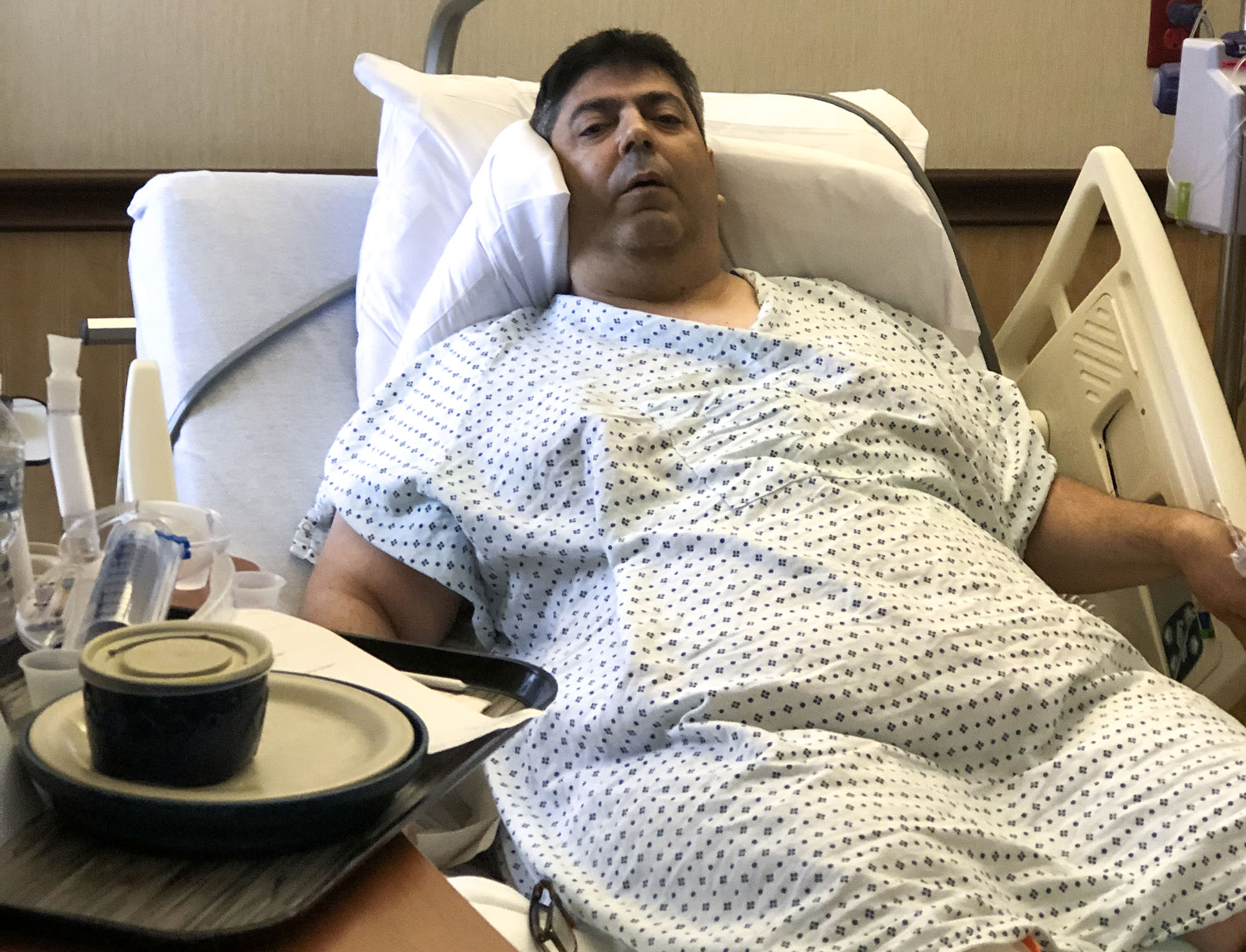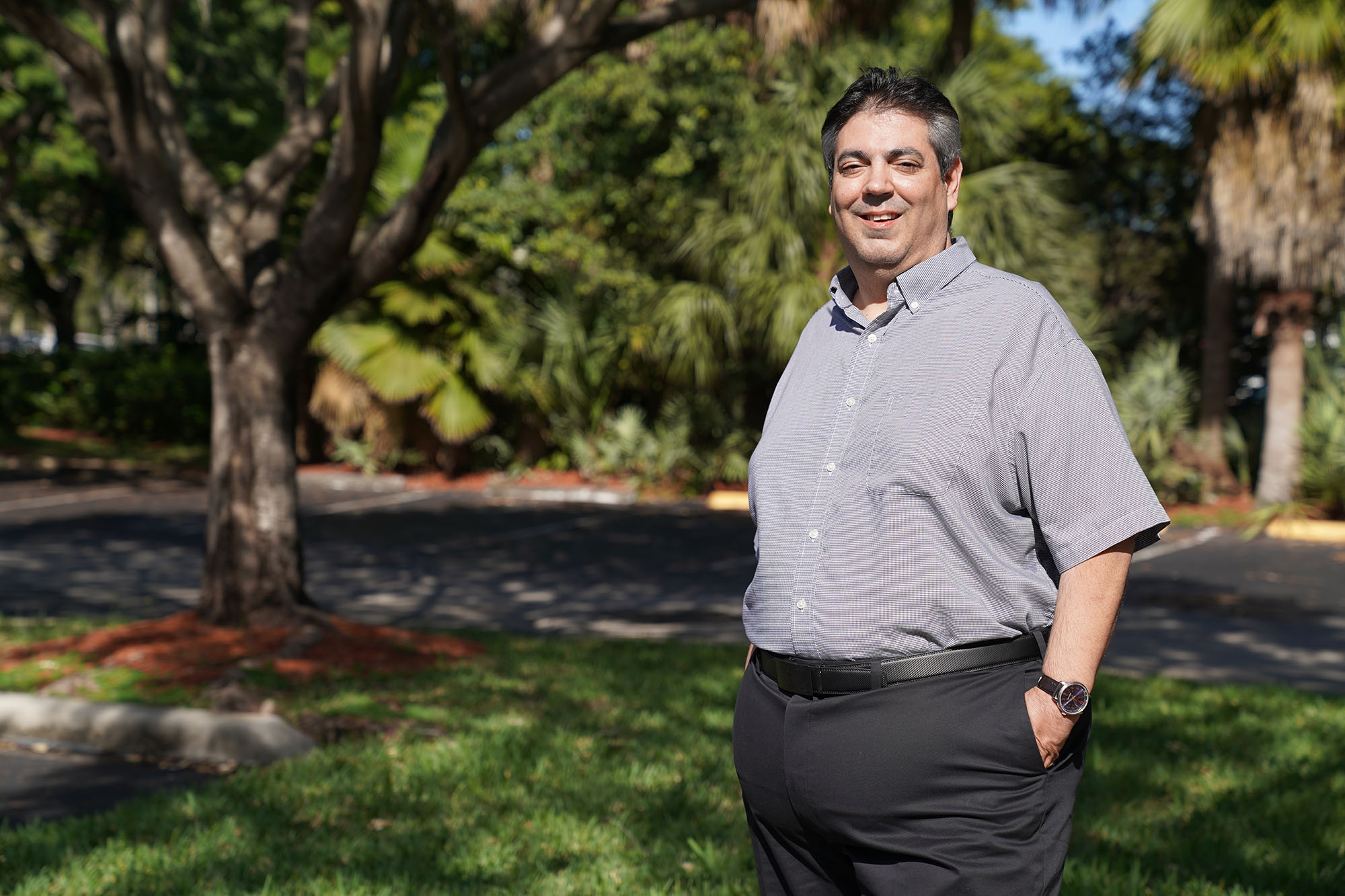Chi Zhang, M.D., a Broward Health Physician Group bariatric surgeon at Broward Health Imperial Point.
By Sharon Aron Baron
More than 40 percent of adults in the United States fit the criteria for obesity — a high-risk condition that leads to progressive health complications and significant personal hardships when left untreated, According to the Centers for Disease Control and Prevention,
Jose Velasquez, 56, of Tamarac, had never struggled with his weight while playing sports in college, but during adulthood, that changed.
The demands of working full-time resulted in a slowdown of physical activity, and the pandemic exacerbated his situation. He began eating more and moving less.
He wasn’t alone.
According to a 2021 American Psychological Association survey, 42% of U.S. adults reported undesired weight gain since the start of the pandemic, with an average weight gain of 29 pounds.
For Velasquez, he gained an additional 50+ pounds last year.
For years, Velasquez tried various ways to lose weight, such as following a commercial low-carb diet and even hunger suppression prescriptions, but nothing worked long-term.
“One of my hobbies is traveling,” said Velasquez. “I been fortunate to have visited 32 countries, but I just wasn’t able to physically move very easily anymore,” he said. The additional weight was also affecting Velasquez’s health.
“I also suffered from hypertension and sleep apnea, and I was a borderline diabetic. Due to excessive weight on my joints, I tore a tendon in my foot, and that led to six weeks in a boot cast, and I became more sedentary,” he said. “I knew I needed to do something before my health got even worse.”
The turning point was in spring 2021, when Velasquez topped 345 pounds. It was then that he decided to make a lasting change and pursue bariatric surgery. A colleague referred him to Chi Zhang, M.D., a Broward Health Physician Group bariatric surgeon at Broward Health Imperial Point.

Jose Velasquez on July 12, 2021 right after surgery.
“After looking at several options, I liked that at Broward Health Imperial Point, everything was in one place,” said Velasquez. “The psychiatrist is here; the dietician is here along with the bariatric nurse and doctor. So, for me as a patient, it was all very reassuring and convenient.”
Another added benefit comes with the type of surgery offered by Broward Health. The bariatric procedures can be performed using minimally invasive robotic assistance, which increases the chances that patients may experience less blood loss, a shorter hospital stay, fewer complications, and a smaller incision mark.
From the first consultation, Velasquez knew he had made the right choice. “Dr. Zhang, along with other members of his team, really listened to me, and I felt like we had a true partnership,” he said. “Following my surgery, my glucose was low, and I began to worry, but he called me back within a half-hour, giving me instructions on how to alleviate my symptoms, which immediately calmed me down.”
Like other bariatric surgery patients, Velasquez underwent a series of health clearances and consultations before scheduling his robotic-assisted bariatric surgery this past summer.
“We offer a multidisciplinary approach to weight loss,” said Dr. Zhang. “Before a patient is scheduled for surgery, we make sure they have medical clearance for the procedure and have them meet with a dietitian and a mental health professional to make sure they understand what is involved in the surgery.”
Before surgery, Velasquez spent four months of preparation, meeting with Valerie Matthews, a certified bariatric nurse at Broward Health Imperial Point, about what to expect before, during, and after surgery. He’s received excellent progress reports during his one, three, and six-month follow-up visits with Dr. Zhang. He also attends monthly support group meetings at the hospital where Velasquez and fellow former bariatric patients share tips, trade recipes, and encourage each other.
Another benefit of robotic-assisted surgery for Velasquez was that it shortened his recovery time.
The day after his bariatric procedure, Velasquez was able to walk. Within two days of his surgery, he was medically cleared to go home and recuperate. Over the past six months, he’s safely lost 83 pounds; weight he’s been able to keep off.
Velasquez says he has much more energy now and the stamina to walk greater distances and more easily climb stairs. His hip and ankle pain is alleviated, and he’s sleeping better. “I no longer have sleep apnea.” By recalibrating his metabolism, modifying his eating habits, and exercising more with regular swims and walks, Velasquez has been able to safely shed five pounds every two weeks and is on track to reach his goal of losing about 160 pounds within a year.
The new year brings revived hopes to travel, and this time without needing an extended seat belt on the plane. In July, Velasquez plans to travel to Arizona to attend a week-long health conference hosted by American Medical Technologists. As president of the trade group’s Florida chapter, Velasquez was asked to present at the conference.
Without this surgery, I would not have been able to make the trip,” said Velasquez, whose weight loss improved not only his health but also his self-confidence. “Now, I am looking forward to regaining my quality of life and resuming one of my favorite hobbies: travel.”
According to the National Institutes of Health, obesity is the second-highest cause of preventable death in the U.S., behind smoking. That’s about 300,000 avoidable deaths a year.
Heart disease, stroke, type 2 diabetes, sleep apnea, and certain cancers are among the obesity-related conditions that are the leading causes of preventable, premature death in those who are obese.
“Studies indicate that bariatric surgery may reduce a patient’s risk of premature death by 30 to 50%,” said Dr. Zhang. “The minimally invasive bariatric procedures are the most effective and long-lasting treatments for morbid obesity currently available.”
“We offer several types of bariatric surgery, including gastric sleeve, gastric bypass, and intra-gastric balloon placement surgery,” explained Dr. Zhang. “I work with each patient to decide the best surgical option for them, depending on their comfort level.”
Broward Health patients have access to a broad range of bariatric services across the system, including Roux-en-Y gastric bypass, laparoscopic adjustable gastric banding, laparoscopic sleeve gastrectomy, and intragastric balloon placement.
The procedures can limit food intake and reduce feelings of hunger. Patients may lose as much as 60% of excess weight six months after surgery and keep losing for one to two years later on average.
The American Society for Metabolic and Bariatric Surgery recommends candidates for weight-loss surgery meet the following requirements:
- One hundred pounds or more above ideal body weight.
- Be between the ages of 15 and 60.
- Have a body mass index (BMI) of 35 or greater with significant co-morbidities.
- Have been unsuccessful with multiple medically supervised weight loss attempts for one to two years.
- Be psychologically stable.
“These are life-changing procedures and should be considered by anyone who meets the requirements,” added Dr. Zhang. “The risk of developing other diseases due to obesity can have serious if not deadly consequences.”
To learn more about bariatric surgery options, including hospital locations, or schedule a consultation, visit BrowardHealth.org/Bariatric.
Bariatric Surgery Transforms Tamarac Man’s Life
Author Profile

Latest entries
 NewsFebruary 3, 2026Broward County Animal Care Hosts Super Bowl Week Adoption Event to Help Pets Find Homes
NewsFebruary 3, 2026Broward County Animal Care Hosts Super Bowl Week Adoption Event to Help Pets Find Homes NewsFebruary 3, 2026One Tamarac Multicultural Festival Returns Feb. 7 With Music, Culture and Kevin Lyttle Headlining
NewsFebruary 3, 2026One Tamarac Multicultural Festival Returns Feb. 7 With Music, Culture and Kevin Lyttle Headlining NewsFebruary 1, 2026Broward Commissioner Udine: February Brings Sports, Film, Art, Remembrance, and Black History Month to County
NewsFebruary 1, 2026Broward Commissioner Udine: February Brings Sports, Film, Art, Remembrance, and Black History Month to County NewsJanuary 29, 2026Tamarac Crime Blotter: Deputy Injured After Suspect Kicks Officer During Arrest
NewsJanuary 29, 2026Tamarac Crime Blotter: Deputy Injured After Suspect Kicks Officer During Arrest







